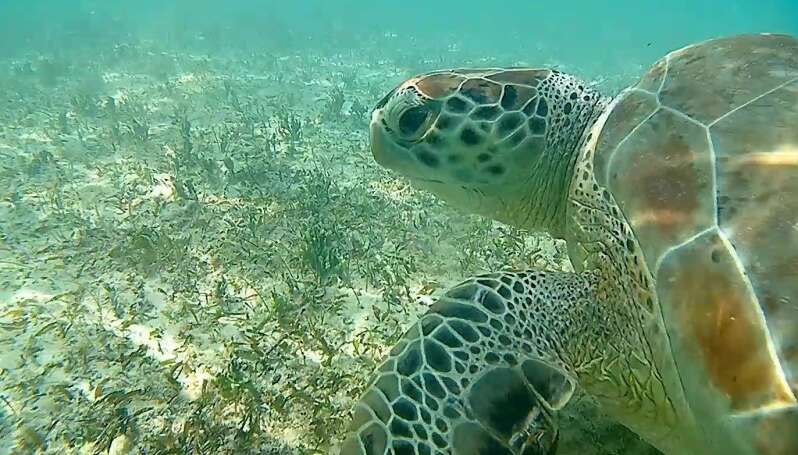Recent News
Remembering the Life of the 'Ocean Vet'Wednesday, November 12, 2014
Where do I begin? How do I find the words? How do you even begin to describe the impact that one person can have not on your own life, but on an entire country?
'Ocean Vet' Burnie dies in diving incident
Wednesday, November 12, 2014
Dr Neil Burnie, the noted veterinarian and fisherman who is well known for his research on marine species, died yesterday after running into difficulties while diving at Horseshoe Bay Beach.
Tributes to an admired custodian of the sea
Wednesday, November 12, 2014
The late veterinarian and ocean activist Dr Neil Burnie has been described as one of Bermuda’s best-loved characters and legendary custodian of the sea.
Bermuda Mourns The Loss Of Dr. Neil Burnie
Tuesday, November 11, 2014
The island is today mourning the loss of Dr. Neil Burnie, the well-known veterinarian and colourful character with an unmatched passion for Bermuda’s marine wildlife.
Staff at BAMZ respond quickly to Hurricane Gonzalo damage
Thursday, November 06, 2014
It takes a great deal of time and energy to prepare your home for an impending storm — making sure your home is secure, that you have an ample supply of food and water, and, if you have pets, making sure they are kept inside and safe.
About
GovernanceAbout Us
Newsletter
Latest News
Gift & Bookstore
Contact
General Inquiries
info@bzs.bm
Latest News
All the latest updates and news from the Bermuda Aquarium, Museum, and Zoo, one of Bermuda's leading visitor attractions!

Many acres of seagrass beds crucial for the survival of sea turtles and other marine life have “completely collapsed” over the last four years, according to a leading environmental group.
The Bermuda Turtle Project says “immediate changes” are needed to save the remaining seagrass beds and to help new ones to grow.
While praising the conservation and research efforts already being carried out by the Department of Environment and Natural Resources to protect seagrass habitats, Jennifer Gray, director of the Turtle Project, said more needs to be done in an opinion piece which appears on the Opinion section of The Royal Gazette today.
Ms Gray said the Bermuda Turtle Project (BTP) is resuming its in-water research this week after a 24-month absence caused by the Covid-19 pandemic, but added it is already clear from observations “there have been some drastic changes in our marine environment”.
She said: “Once thriving seagrass beds have been in decline for some two decades, but over the last 48 months many acres of this critical habitat have completely collapsed with not a blade of grass left.
“Along with the disappearance of seagrass comes numerous consequences comprising disturbance and shifting of the marine sediments that were once held stable by the root systems of the seagrass and a vulnerability to the arrival of potentially invasive species, especially algae.
“Even more troubling is the seeming departure of once-visible species like fish and sea turtles. BTP has been documenting a change in the size class of green turtles on the Bermuda platform that shows green turtles departing our shores at a smaller size than they once did.”
Ms Gray said it is likely that some sea turtles are still living around Bermuda and may have changed habitats.
“We need to get out there and conduct our research to obtain a clearer picture of what is happening,” said Ms Gray.
“We know there are still turtles here, and that they appear to be utilising new habitats around the island. There have been observations of small green turtles feeding on algae and even mangrove leaves, perhaps making a diet change rather than risking a migration. Further studies are essential and will help fill in the blanks on what, exactly, is happening with sea turtles in Bermuda.”
She said research is also needed on other causes of seagrass decline including seagrass pathogens and disease, some of which have wiped out similar habitats on the US coastlines and could have easily arrived in Bermuda.
In the meantime, she said other immediate steps can be taken to arrest the decline in the seagrass and sea turtle and fish populations.
These include protecting sharks and other natural predators in order to return to a more natural balance in the food web and ecosystem and Introducing marine protected areas (MPAs) where harmful fishing practices, anchoring, engine outputs and propeller scarring are eliminated.
“This would afford a better chance for seagrass recovery and the return of juvenile fish which, when they multiply, would spill outside the protected area, providing an increase in abundance in areas where fishing does take place.”


